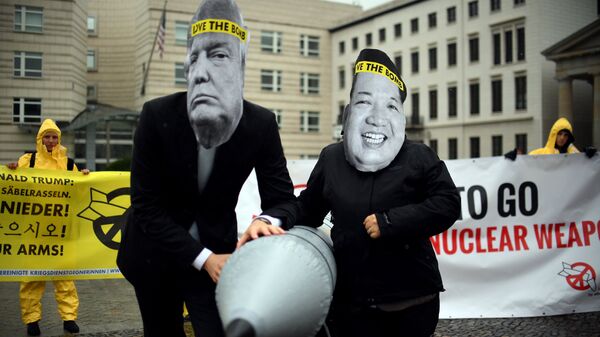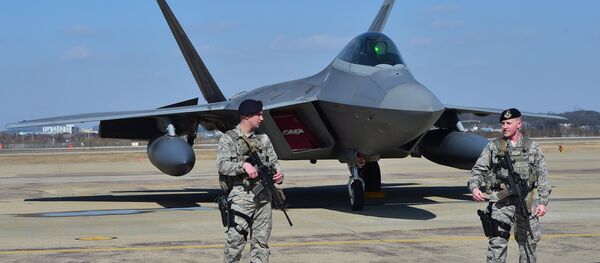After US President Donald Trump agreed to hold a meeting with North Korean leader Kim Jong Un, a key question remains unresolved for the summit, as both sides have not reached an agreement on the location of the meeting, which is expected to take place in late May or June.
READ MORE: Japan Hopes US-N Korea Summit to Pave Way for Settlement of Nuclear Issue – Abe
US media reported that senior US officials had ruled out a number of locations over security concerns, such as North Korea’s capital Pyongyang, the Chinese capital of Beijing and Mongolia, as well as Panmunjom in the Demilitarized Zone on the Korean Peninsula. The US side is reportedly pushing for more neutral locations in Europe, such as Geneva or Switzerland.
National Dignity
North Korea watchers suggested that both sides needed to step out of their comfort zone and make compromises before they could reach an agreement on the location of the upcoming summit.
"All of the proposed locations have their pros and cons, respectively. In a sense, it’s inevitable for both sides to break away from the previous travel preference of their leaders," Zhao Tong, a fellow at Carnegie’s Nuclear Policy Program at the Carnegie-Tsinghua Center for Global Policy in Beijing, told Sputnik.
The Beijing-based expert illustrated the dilemma Kim Jong Un faces if he has to travel to Europe for the summit.
"For Kim Jong Un to travel to Europe, there’s still a question of whether he would agree to take a flight provided by a foreign country, or if he would allow an Air Koryo flight to stop and refuel on the way. Would the mid-way refueling be viewed as a sign of weakness in Air Koryo’s planes and hurt North Korea’s dignity? North Korean leaders have never traveled overseas on foreign aircraft while still in office. Without any precedents, we don't know the possibility of them accepting this option," he said.
Southeast Asian nations may not be a better choice for North Korea, compared to locations in Europe, the expert added.
Zhao explained why Trump might not want to travel to the Korean Peninsula for the summit.
"For Trump, Panmunjom in the Demilitarized Zone is too deserted to hold this grand summit. It’s not enough to support the historic scene Trump wants. And after the inter-Korea summit takes place there, Trump definitely doesn’t want to follow the footsteps of others and would prefer a new location," he said.
Europe-based North Korea watchers suggested that Jeju Island off the coast of the Korean Peninsula could be a viable option.
"Another possibility [for the summit] I have not seen mentioned in the media is Jeju Island in South Korea. The summit between [former South Korean president] Kim Dae-jung and [former North Korean leader] Kim Jong-il was held in Pyongyang. It could be time for Kim Jong Un go to South Korea, not to Seoul, but perhaps to Jeju Island, which has excellent facilities for the summit. I think Kim Jong Un would be more comfortable having a meeting somewhere in Asia," Stein Tonnesson, a research professor focusing on East Asian peace research at the Peace Research Institute in Oslo, told Sputnik.
Negotiation Tricks
Trump expressed optimism about his upcoming summit with the North Korean leader and stressed his firm stance by vowing to "pull out" if he finds meeting not productive.
"If I think that if it's a meeting that is not going to be fruitful, we're not going to go. If the meeting when I'm there is not fruitful I will respectfully leave the meeting," Trump said at a press conference on Wednesday.
Despite his usual hawkish rhetoric, Trump may become more pragmatic when meeting with Kim Jong Un, Zhao from the Carnegie-Tsinghua Center argued.
READ MORE: US Strikes on Syria Message to Iran, N Korea — Constitutional Commision Member
"I believe Trump’s comments fit his usual style for negotiations. Before the negotiations start, he would raise the bar really high with all kinds of excessive demands. It was the same situation when South Korea and the United States negotiated on trade issues. Trump made a lot of demands, but once South Korea offered some concessions, Trump was easily satisfied. As long as they can meet, I don’t think Trump will admit that this important decision of meeting Kim Jong Un was a mistake. No matter what kind of results come out in the end, Trump would describe the meeting as a key historic success," he said.
"It’s unlikely for Kim Jong Un to make fundamental concessions on his nuclear arsenal. It’s possible for him to set denuclearization as a long-term goal. But it’s hard for me to imagine North Korea to agree to a specific timetable of 3-5 years to eliminate its nuclear weapons completely. I believe Trump will not hold onto the difficult demand of complete denuclearization for North Korea in the short term. He could accept a promise from North Korea to denuclearize in the future and start the process of reaching this goal," he said.
Professor Tonnesson from Peace Research Institute in Oslo pointed out that the details of the agreement between Trump and Kim Jong Un, as well as how it is going to be executed, will be the true testament whether the summit is a success.
"There will be a clear promise from the North Korean side to contribute to the denuclearization of the Korean Peninsula. But the details are what really count here. I doubt North Korea would sign on to international inspection or reduction in their number of nuclear bombs. These are the kind of details that hopefully someone in the Trump administration would put on the negotiation table and get North Korea to agree to a concrete deadline. I do not trust the Trump administration’s ability to develop this kind of waterproof agreement sufficiently. My fear is that Kim Jong Un and Trump will make a vague deal and they can tell the world that we have this great peace agreement. And next year, we see a conflict coming up about the implementation," he said.
A Normal Country
After announcing North Korea completed the development of its nuclear arms program last November, following the successful test of its most powerful intercontinental ballistic missile, Kim Jong Un adapted a foreign policy that focuses on dialogue with the outside world, by sending a delegation to the Winter Olympics held in South Korea and agreeing to meet with both South Korean and US leaders.
READ MORE: Russian Admiral Explains Why Western Strike on Syria Was Poorly Coordinated
Kim Jong Un has always been following the same strategy consistently and aspired to become a reform-minded leader like Deng Xiaoping, who is often viewed as the architect the reform and opening-up policy that kick-started China’s explosive economic growth in the past 40 years, Zhao from the Carnegie-Tsinghua Center suggested.
"I believe North Korea had a two-step strategy. The first step was to develop basic nuclear deterrence capabilities at all cost to meet its fundamental security needs. This target was reached by the end of 2017. Now they’re entering the second step of developing normalized relations with the international community, while maintaining its existing nuclear capabilities. The most appealing signal Kim Jong Un sent out is that he wants to focus on economic development, after addressing the nation’s security concerns. His long-term goal is to become North Korea’s Deng Xiaoping. He hopes to turn North Korea into a prosperous and well respected normal country in the international community," he said.
The expert believes such intentions from Kim Jong Un are widely welcome by many countries, including the United States, because North Korea will be less obsessed with developing nuclear weapons and become a less security threat in the region, once it becomes an accepted member of the international community.
Views and opinions expressed in this article are those of the contributors and do not necessarily reflect those of Sputnik.





